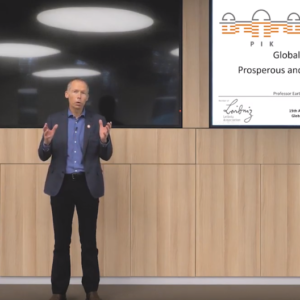During the 15-year anniversary celebration for the Julie Ann Wrigley Global Institute of Sustainability at Arizona State University, Dr. Johan Rockström virtually presented about climate tipping points and what we must do to avoid them. Rockström is the director of the Potsdam Institute for Climate Impact Research, the co-director of The Earth League and co-organizer for the upcoming Global Futures 2021.
Rockström begins the presentation by pointing out that incidents such as the Australian wildfires support the consensus that extreme weather events like the fires are tied to “antigenic global warming.” He cites a number of scientific studies showing that we are experiencing the warmest temperatures on earth since the last ice age. Nineteen years ago, the assessment was that it would take a 5 to 6 degrees Celsius warming before we started experiencing major impacts of climate change. Today that risk is considered to be 2 degrees Celsius — a number we are rapidly approaching. Rockström explains that if we exceed warming of 2 degree Celsius, then the Earth could go from being a “friend” that dampens and reduces warming to being a foe that begins to self-reinforce warming.
Citing more studies, Rockström reminds us that the top five risks for the global economy are related to planetary boundaries and we need to rapidly make changes if we want a good chance of keeping the planet in a state to support humanity. The video concludes with Rockström showing a paper that shows it is indeed possible to cut emissions by half every decade to lead to a zero-carbon world economy by 2050. He says that with known technologies, we can cut the emissions in each industry by half over the coming decade.
